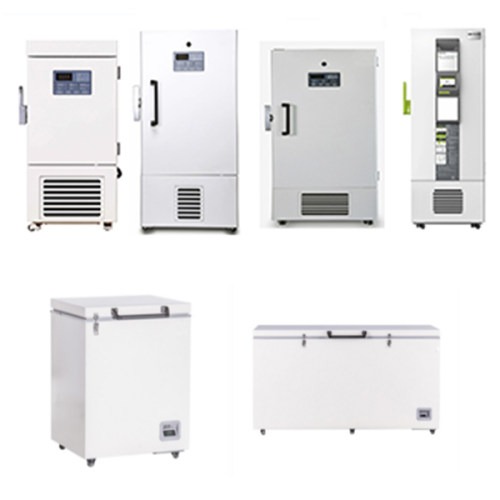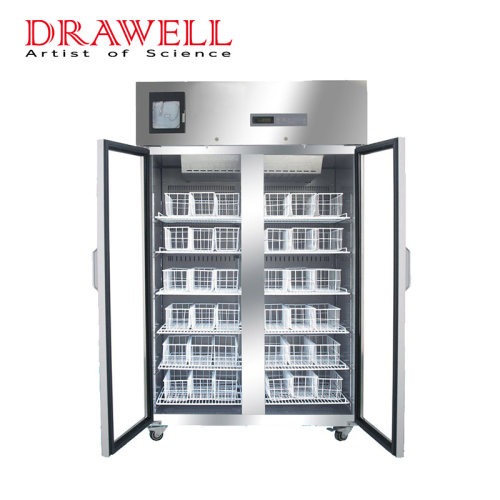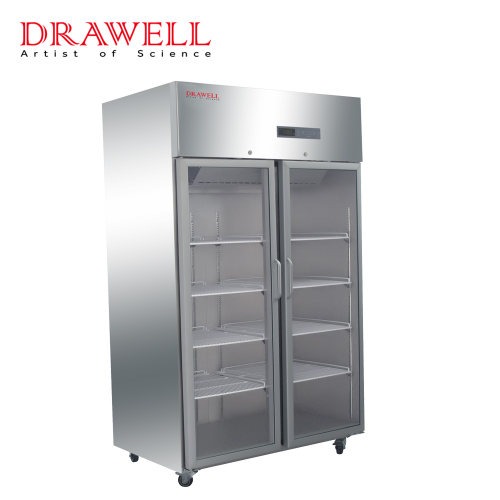From standard upright units to specialized cryogenic freezers, the range of laboratory refrigerators available reflects the diverse needs of laboratories worldwide. Selecting the right laboratory refrigerator is crucial for maintaining the integrity and safety of temperature-sensitive
materials. In this article, we’ll delve into the various types of laboratory refrigerators, their unique features as well as the applications for which they are best suited and the careful consideration of various factors to ensure optimal performance, reliability, and safety.
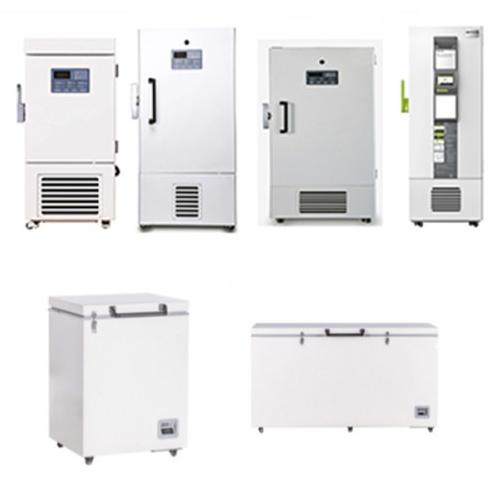
Understanding the Basics of Laboratory Refrigerators
Laboratory refrigerators are specialized appliances designed to store temperature-sensitive materials, including biological samples, reagents, vaccines, pharmaceuticals, and chemicals, in controlled environments. These refrigerators play a crucial role in maintaining the integrity and viability of stored materials, making them indispensable tools in scientific research, healthcare, and pharmaceutical industries.
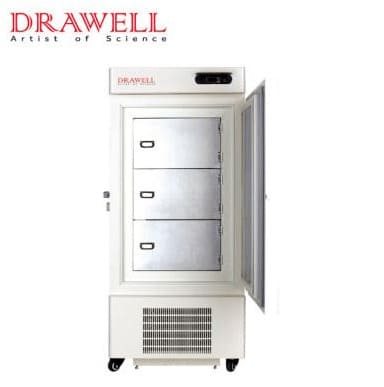
Key Components
| Component/Feature | Description |
| Insulation | High-quality insulation materials minimize heat transfer and maintain stable internal temperatures. |
| Temperature Control System | Advanced systems allow precise temperature regulation within the storage compartment. |
| Cooling Mechanism | Utilizes compressor-based or thermoelectric systems for efficient cooling performance. |
| Interior Shelving | Adjustable shelves or racks offer flexibility in organizing and storing various materials. |
| Door Seal | Robust seals ensure tight closure to prevent temperature fluctuations and maintain stability. |
| Temperature Monitoring | Sensors and alarm systems alert users to temperature deviations or malfunctions, preventing spoilage. |
| Safety Features | Specialized features in certain types, such as explosion-proof designs, mitigate risks with hazardous materials. |
Different Types of Laboratory Refrigerators
1. Standard Upright Refrigerators
Standard upright refrigerators resemble traditional household refrigerators and are commonly used for general-purpose storage of laboratory materials. They typically feature adjustable shelves, door storage compartments, and a temperature control system. These refrigerators are suitable for storing a wide range of materials at temperatures above freezing.
2. Undercounter Refrigerators
Undercounter refrigerators are compact units designed to fit beneath laboratory countertops or benches, optimizing space utilization in small or crowded laboratories. They offer similar features to standard upright refrigerators but have a lower profile for convenient placement in laboratories with limited space.
3. Pharmacy Refrigerators
Pharmacy refrigerators are specifically designed for storing pharmaceuticals, vaccines, and other temperature-sensitive medications. They often feature precise temperature control systems, temperature monitoring, and alarm systems to ensure compliance with regulatory requirements such as CDC guidelines for vaccine storage.
4. Explosion-Proof Refrigerators
Explosion-proof refrigerators are engineered to prevent the ignition of flammable vapors or gases present in hazardous laboratory environments. These refrigerators feature spark-proof interiors, specialized seals, and ventilation systems to minimize the risk of explosions in volatile settings such as chemical laboratories.
5. Blood Bank Refrigerators
Blood bank refrigerators are designed to store blood products, plasma, and other biological materials at controlled temperatures. They typically maintain temperatures between 1°C to 6°C to preserve the integrity of blood components for transfusion purposes. Blood bank refrigerators often include temperature monitoring, alarms, and secure locking mechanisms.
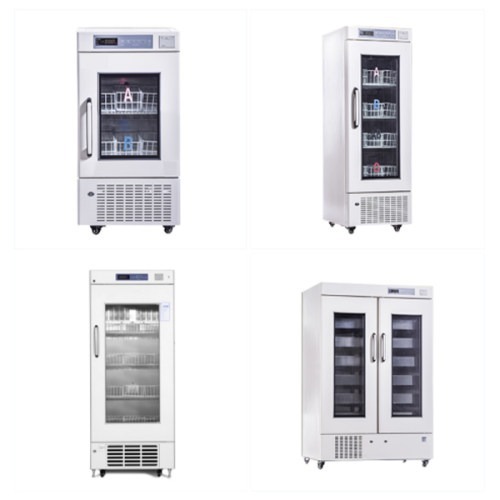
6. Ultra-Low Temperature (ULT) Freezers
Ultra-low temperature freezers are used for long-term storage of samples, enzymes, vaccines, and other biological materials at ultra-low temperatures, typically ranging from -40°C to -86°C. These freezers employ advanced insulation and cooling technologies to maintain stable low temperatures essential for preserving sample integrity.
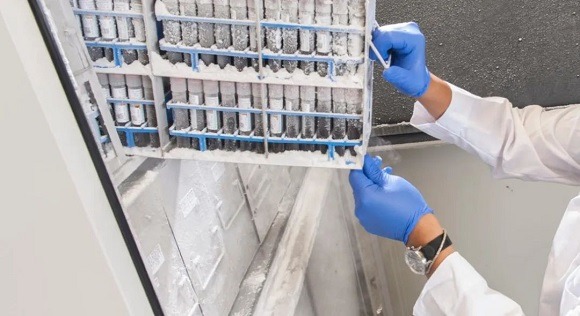
7. Cryogenic Refrigerators
Cryogenic refrigerators, also known as cryofreezers or liquid nitrogen dewars, utilize liquid nitrogen or other cryogenic gases to achieve extremely low temperatures for the storage of biological samples, cell lines, and tissues. These refrigerators are essential for long-term preservation of samples at temperatures below -150°C.
8. Flammable Material Refrigerators
Flammable material refrigerators are designed to safely store volatile or flammable chemicals and solvents in laboratory settings. These refrigerators feature spark-proof interiors, explosion-proof seals, and ventilation systems to prevent the ignition of flammable vapors and ensure compliance with safety regulations.
9. Chromatography Refrigerators
Chromatography refrigerators are specially designed to store chromatography columns, reagents, and related equipment used in analytical chemistry applications. These refrigerators often feature precise temperature control, adjustable shelving, and specialized compartments to accommodate chromatography components.
10. Environmental Test Chambers
Environmental test chambers are versatile units used for conducting temperature and humidity testing on various materials, products, and components. These chambers simulate environmental conditions such as temperature extremes, humidity levels, and altitude changes to assess product performance and reliability under different conditions.
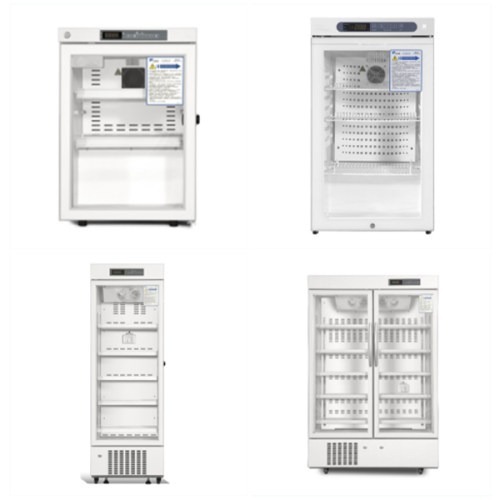
Key Considerations to Choosing the Right Type of Laboratory Refrigerator
1. Temperature Range and Stability
One of the most critical factors to consider when selecting a laboratory refrigerator is the temperature range and stability it offers. Different applications may require specific temperature conditions for storing samples, reagents, or vaccines. Ensure the refrigerator you choose can maintain the required temperature range with minimal fluctuations to preserve the integrity of sensitive materials.
2. Capacity and Storage Requirements
Evaluate your laboratory’s storage needs to determine the appropriate capacity for the refrigerator. Consider the volume of samples or specimens you need to store regularly and choose a refrigerator with adequate storage space. Additionally, assess the interior layout and shelving options to ensure efficient organization and accessibility of stored items.
3. Energy Efficiency
Energy efficiency is essential not only for reducing operational costs but also for minimizing environmental impact. Look for laboratory refrigerators with energy-efficient features such as high-quality insulation, LED lighting, and advanced temperature control systems. Energy Star certified models can help you identify refrigerators that meet stringent energy efficiency standards.
4. Temperature Monitoring and Alarm Systems
Maintaining precise temperature control is crucial for preserving the integrity of stored materials. Choose a laboratory refrigerator equipped with temperature monitoring and alarm systems to alert you of any deviations from the set temperature range. Advanced models may offer remote monitoring capabilities, allowing you to monitor temperature levels and receive alerts remotely.
5. Compliance with Regulatory Standards
Ensure that the laboratory refrigerator you select complies with relevant regulatory standards and guidelines, such as FDA regulations or Good Laboratory Practice (GLP) requirements. Depending on your industry and the type of materials stored, you may need a refrigerator that meets specific certification standards for temperature accuracy, safety, and hygiene.
6. Durability and Reliability
Invest in a laboratory refrigerator that is built to withstand the rigors of daily use in a laboratory setting. Look for models constructed from high-quality materials and equipped with robust components for long-term durability. Consider factors such as door construction, sealing mechanisms, and compressor reliability to ensure the refrigerator can withstand frequent opening and closing without compromising temperature stability.
7. Specialized Features and Accessories
Depending on your specific laboratory requirements, you may need a refrigerator with specialized features or accessories. For example, some applications may require a frost-free or auto-defrost function to prevent ice buildup, while others may benefit from adjustable shelves, door locks, or access ports for monitoring probes. Evaluate your unique needs and prioritize features that enhance functionality and convenience.

Conclusion
Whether storing vaccines in a pharmacy refrigerator or preserving samples in a cryogenic freezer, selecting the appropriate type of laboratory refrigerator is essential for maintaining sample integrity, compliance with regulations, and ensuring safety in laboratory environments. By understanding the features and applications of different types of laboratory refrigerators, laboratories can make informed decisions to meet their specific storage requirements effectively.
Take the time to assess your needs carefully and invest in a high-quality refrigerator that offers reliable performance and peace of mind.


